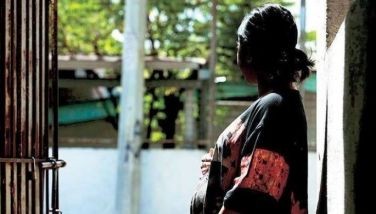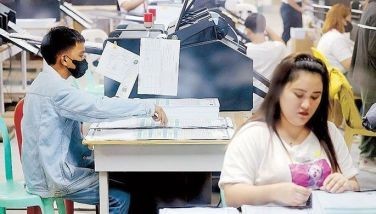'No basis for Corona to inhibit from GMA cases'
MANILA, Philippines - Senate President Juan Ponce Enrile and Sen. Miriam Defensor-Santiago yesterday reiterated the dangers to the country’s democracy of calls for Chief Justice Renato Corona to inhibit himself from the cases involving former President Gloria Macapagal-Arroyo.
“If all appointees of the president must inhibit when the case is involving that president ... then you have no Supreme Court. What kind of system are we going to have?” Enrile said at a weekly media forum at the Senate.
“I am not defending anyone. I’m just scrutinizing the logic. If that is the case of GMA, then it is the case of the incumbent of the president like Justice (Bienvenido) Reyes and others. But based on that presumption, there are justices partial to the former. I don’t think that is the correct presumption,” he said.
He stressed the need to consider the international audience in dealing with the issue.
“We are supposed to be the first democratic republic in Southeast Asia. And I hope we protect that image,” he said.
Meanwhile, Santiago, a constitutional law expert and former regional trial court judge, said those calling for the inhibition of the Chief Justice “are trying to be a law unto themselves.”
“They seek no less than the unconstitutional power to determine who will judge what cases. The Constitution does not grant that power to anybody, no matter how strident or self-righteous,” she said in a statement issued from New York, where she is campaigning as the Philippine candidate to the International Criminal Court.
She said pressuring any judge or justice to inhibit himself from a case also violates the independence of the judiciary.
“If a howling mob is allowed to pressure the chief justice or any justice to inhibit, that would serve as a calamitous precedent. Any litigant would then be able to pressure an impartial judge to inhibit, in order to obtain a group decision from the substitute,” she said.
“In effect, the pressure on Corona to inhibit is an effort to substitute him with Carpio. If it can be said that Corona might be biased in favor of Arroyo, it can also be said that Carpio might be biased against Arroyo. We cannot allow the composition of the Supreme Court in a certain case to be determined by an unelected exterior group on the basis of the group’s own political biases,” she added.
Santiago described as “arrogant and supercilious” the call of certain groups to force Corona to inhibit.
“This group is suffering from doctrinal confusion on the nature of a tripartite democracy. They want to be higher than the Supreme Court. It is improper for the political branches (executive and legislative) to influence the judicial branch. But this group thinks that it is a fourth branch. You have to admire their hubris,” she said.
Santiago cited decisions of Philippine and US courts upholding the principle that judicial inhibition should be discretionary on the part of the judge and not forced on him by interested parties.
In the 2001 case of Soriano vs. Court of Appeals, she said the Supreme Court held that a litigant may not demand that a judge inhibit himself. She also cited the 2004 case of Dimo Realty and Development Inc. vs. Dimaculangan, where it was held that whether judges should inhibit themselves from a case “rests on their own sound discretion.”
In the 2006 case of People vs. Ong, she said the Supreme Court affirmed the discretion of the judge to inhibit himself. She said the ruling said judges are in “a better position to determine the issue of voluntary inhibition as they are the ones who directly deal with the parties-litigants in their courtrooms.”
She said a 1976 US court ruling states that a judge is presumed impartial, while another decision said prejudice merely based on, or growing out of, a business or professional relationship, or political or social relations ordinarily is not sufficient to disqualify a judge.
- Latest
- Trending































